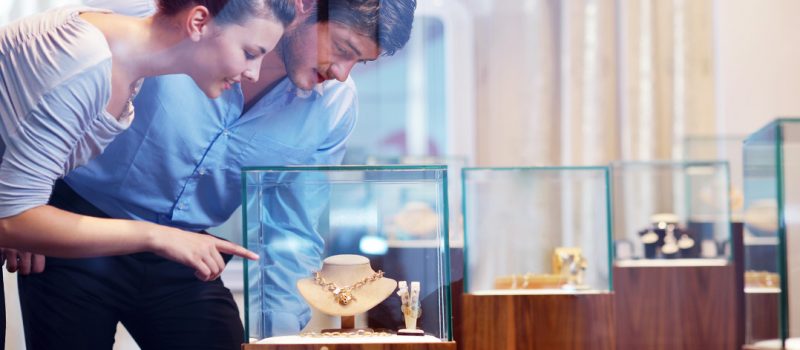What is important for you when choosing a diamond – the colour, clarity or size? Do you understand how these impact upon the price? What safeguards should you have to ensure that you are getting what you paid for?
Imperfect information sources of the customer
I have always witnessed customers grapple with understanding the 4Cs (Cut, Colour, Clarity, Carat Weight) of a diamond and their influence on the price of the diamond. Unfortunately, the customer has limited or incomplete information. They are not expected to be knowledgeable or experienced, hence they obviously rely upon the salesperson to provide that knowledge.
However, most salespeople are not diamond graders either. They may have been given a degree of training by the employer to interpret the 4Cs; but essentially, a salesperson will work on your emotional side to build that trust and secure a sale. Don’t get me wrong, I am not saying that all salespersons are dodgy and are just out to get your money. Sure, there are those who are aggressive in their sales techniques, sadly speaking. However, I have worked with a number of salespeople who even though they may not have an in-depth knowledge of grading, they were very genuine in their sales approach with a view to build truly wonderful and long cherished customer relationships. Diamonds are after all a luxury product and the process of building trust, providing genuine information, and thereby, creating long lasting relationships matter hugely.
The other source of diamond information for customers is the internet, media and friends. Neither of which are perfect sources.
I often find a customer who wants a high colour and high clarity diamond and their entire buying decision process is reliant upon the information in the diamond certificate. There are two issues here. First, the concept that a high colour and high clarity equals a sparkling diamond. Wrong. I will address this later in this piece. Secondly, the customer will waste weeks and often months “shopping around” and comparing numerous certificates before they make their final decision. This has made the buying process as though one is buying a commodity. Wouldn’t it be much better to enjoy the experience of choosing a beautiful diamond regardless of what the diamond certificate says?
How do you know you are getting value for money?
Imperfect information on the 4Cs and their impact on price can make things very confusing. It becomes hard for the customer to know whether they are really getting good value for money.
I give below, a table of the 4C’s of a diamond and rate their effect on price and beauty:
Price Beauty
Cut $ Most
Colour $$ A Lot
Clarity $$$ Some
Carat Weight (Size) $$$$ ?
I have seen low colour and low clarity diamonds with an amazing sparkle and conversely, high colour and high clarity diamonds which look dead as a door knob. Colour and clarity do not add to the sparkle of a diamond. They add value to it. So, the higher they are the more expensive your diamond will be.
What is your definition of beauty in a diamond?
With this in mind, ask yourself:
- How important is it that you get a high colour and high clarity (and hence pay the high price)?
- Is the size of the diamond your definition of beauty (‘big is better’)?
- How important is a high clarity for you? Is it important that if you squint your eyes you may see those one or two imperfections in the stone? And trust me, as you get older, your eyes will find it harder to spot those imperfections, but they will still see the sparkle in the stone.
What if I show you a diamond with slight fluorescence and excellent light return (sparkle)? Fluorescence is a naturally occurring feature in some diamonds which will give the diamond a blue-ish hue in ultra-violet light. The degree to which it exists in a stone can vary from strong to medium to slight. Stronger grades of fluorescence will devalue the stone. I view fluorescence just like we have our own naturally occurring skin features.
A slight level of fluorescence actually gives the diamond a beautiful glow and hue and the stone will be somewhat cheaper. So, it is certainly worthy of consideration.
Then there is the issue of carat weight. How important is it that you get the 1 carat or 1.50 carat? “Magic sizes” are more expensive than their slightly lesser sizes: the 0.80 – 0.90ct or the 1.30 – 1.40ct range. The physical difference in dimensions between say a 0.80ct and a 1ct diamond is so miniscule but the price difference can be 25% or more. It is a demand and supply factor. Diamonds are cut for weight. For some people, size is an ego factor.

Trust your eyes!
In some cultures, high colour and high clarity reflect purity. My best suggestion is to actually look at the diamond. Every pair of eyes are different and what is beautiful for you may not be for someone else. So regardless of whether it is a high colour, high clarity or a low colour, low clarity or something in between, if it sparkles to you that is your answer. Enjoy the experience of this process. Don’t base your decision on the diamond certificate. Yes, the diamond certificate is important, but it should be a means to confirm that the information given to you by the salesperson is true and certified.
What can you do to ensure you get what you pay for?
That brings me to another critical factor in your diamond buying process. The importance of the diamond certificate and a valuation for insurance purposes. Here I would simply like to site an example – extreme and unique as it may be; however, a worthy one to learn from:
Paul Alfonso purchased two diamonds from the international master jeweller, Nirav Modi. Nirav Modi was once ranked by Forbes as India’s 84th richest person with a net worth of US$1.74 billion. The first diamond Alfonso purchased was a Round Brilliant, 3.20ct, D/VVS1 for US$120,000 and the second an oval cut, 2.5ct for US$80,000. Money was wired to Modi’s bank account and the stones delivered. The customer was promised that the diamond certificates would be couriered to his house. The certificates never came. The customer subsequently discovered that the stones were false and soon after, news broke that Modi was responsible for the biggest bank fraud in Indian history. The customer lost his money and his fiancée. Read the full story here.
This is not to suggest that every jeweller is a fraud. It is an extreme example. But it highlights the fact that even though you should not base your buying decision solely on the diamond certificate, having that certificate and an appraisal from a valuer is important for your peace of mind.
So, shop wisely and most importantly, enjoy the process of looking at the sparkle of the diamonds. Your eyes never lie and you will get to a stage in the process where you will be able to see which stone sparkles the most to you. That is your answer.
This article was written by Amit Laxman, Radiant Diamonds, Melbourne, Australia.
Radiant Diamonds specialise in the manufacture of bespoke jewellery using naturally sourced fancy coloured diamonds and colourless (white) diamonds.
http://www.radiant-diamonds.com/

For further education articles all about jewellery:
https://jewellerymonthly.co.uk/category/jewellery_education/





